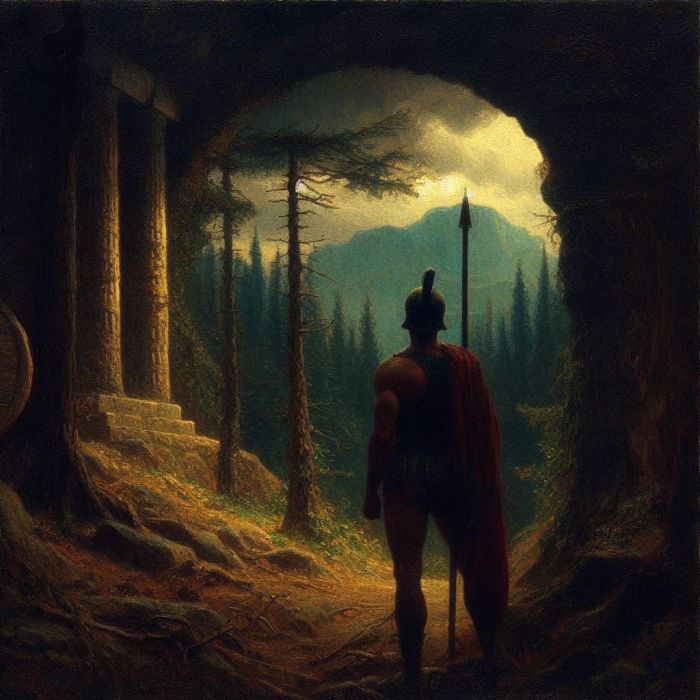
In very ancient times there was a dense, feared, and trackless forest that separated the territory of Rome from that of Etruria. It was called the Ciminian Forest (Silva Ciminia), and it was a region that the Romans avoided.
We can imagine that Roman mothers told their wide-eyed children stories of monsters and demons lurking in this unknown arboreal wilderness. The historian Livy (IX.36) provides us some details. He says that the Ciminian Forest was, several centuries before his time, even thicker than the forests of Germany; no one had ever dared to enter it. But then one man offered to do what everyone else was afraid to do: he would penetrate this dark forest and see what it contained. His name is uncertain; Livy gives it as Marcus Fabius, but admits that it could have been Caeso Fabius or Caius Claudius. The military historian Frontinus (I.2.2) gives his name as Fabius Caeso. We do not know who he was with certainty. What we do know is that someone had the courage to volunteer for a task that everyone else was afraid to do. Let us accept Frontinus’s identification and call him Fabius. The date of his enterprise was about 310 B.C.
This Fabius was equipped with a special qualification for his forest exploration: he was fluent in the Etruscan language. Livy says that, in the third century B.C., it was likely that educated Romans had a familiarity with Etruscan, in the same way that learned Romans in his own day were proficient in Greek. Fabius entered the forest accompanied only by a slave who could also speak Etruscan. They wore Etruscan dress and carried javelins. They were counting on the fact that no one would expect a Roman to enter so terrifying and formidable a region.

We must remember that Italy in those days contained a variety of peoples and cultures. There were Etruscans, Umbrians, Oscans, Mesapii, Samnites, and Ligurians, as well as Greeks and Carthaginians, among others. Rome’s domain was among the smallest on the Italic peninsula; but she was organized, aggressive, resilient, and utterly determined to form alliances and expand the reach of her authority. Fabius Caeso succeeded in his forest mission. He was able to accomplish what everyone had thought to be impossible: he penetrated the forest without detection, and emerged from the other side.
And when he did emerge, he found something remarkable, something he had never expected. He discovered that the people on the other side—the Umbrians—were not hostile to Rome. In fact, they gave Fabius a courteous reception. He was introduced to the senate, and told the Umbrians of his consul’s desire to conclude an alliance. These Umbrians of Cameria agreed to his requests. This is how the historian Frontinus describes the incident:
At a time when more professional methods of conducting reconnaissance were as yet unknown to Roman field commanders, Quintus Fabius Maximus during the Etruscan war ordered his brother Fabius Caeso, who was proficient in the Etruscan language, to put on Etruscan clothing and probe the Ciminian Forest, which our soldiers had never entered. He carried out this mission with such prudence and diligence that, after passing through the forest and realizing that the Umbrians of Cameria were not antagonistic to the Roman cause, he convinced them to become allies.
Fabius Caeso’s diligence, prudence, and diplomatic skills had accomplished something remarkable. It often happens that we are blinded by our fears, preconceptions, and old ways of thinking. These preconceptions can indeed blind us to what may be possible between individuals and nations. All that is required is the will to imagine and construct a new paradigm. If we wish to forge understandings between ourselves and others, sometimes we must be prepared to take bold and unorthodox steps; we must be prepared to enter unknown or frightening territory.

Once this Ciminian Forest of the mind has been penetrated, we may find that what is located on the other side is not nearly as fearsome as we once supposed. The exigencies of war must eventually give way to the imperatives of peace. Those whom we imagined to be irreconcilable enemies may in fact be willing to reach a suitable accommodation. Preconceptions, prejudices, and old modes of thinking will need to be set aside in the interests of survival, humanity, and common sense. What is required is a man of sensitivity and intrepidity to take the first audacious step: a courageous visionary willing to plunge into that dark and uncharted forest.
.
.
Take a look at the new, annotated, illustrated translation of Cicero’s On The Nature Of The Gods, available in paperback, hardcover, Kindle, and (very soon) audiobook:
.


You must be logged in to post a comment.